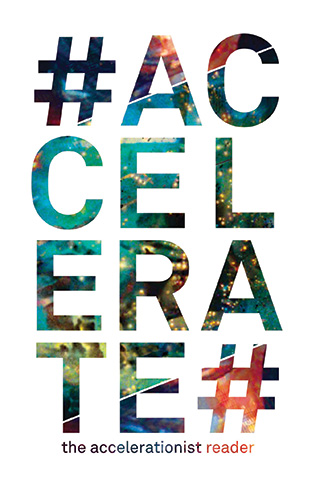Robin Mackay, Armen Avanessian (eds.), #Accelerate: The Accelerationist Reader (2014)
Filed under book | Tags: · accelerationism, capitalism, critique, cyberculture, labour, neoliberalism, politics, technology, theory

“Accelerationism is the name of a contemporary political heresy: the insistence that the only radical political response to capitalism is not to protest, disrupt, critique, or détourne it, but to accelerate and exacerbate its uprooting, alienating, decoding, abstractive tendencies.
#Accelerate presents a genealogy of accelerationism, tracking the impulse through 90s UK darkside cyberculture and the theory-fictions of Nick Land, Sadie Plant, Iain Grant, and CCRU, across the cultural underground of the 80s (rave, acid house, SF cinema) and back to its sources in delirious post-68 ferment, in texts whose searing nihilistic jouissance would later be disavowed by their authors and the marxist and academic establishment alike.
On either side of this central sequence, the book includes texts by Marx that call attention to his own ‘Prometheanism’, and key works from recent years document the recent extraordinary emergence of new accelerationisms steeled against the onslaughts of neoliberal capitalist realism, and retooled for the twenty-first century.
At the forefront of the energetic contemporary debate around this disputed, problematic term, #Accelerate activates a historical conversation about futurality, technology, politics, enjoyment and capital. This is a legacy shot through with contradictions, yet urgently galvanized today by the poverty of ‘reasonable’ contemporary political alternatives.”
Publisher Urbanomic, Falmouth, with Merve, Berlin, 2014
ISBN 9780957529557
536 pages
Reviews: Malcolm Harris (New Inquiry), J.J. Charlesworth (Art Review), Simon O’Sullivan (Mute), Alex Andrews (Review31), Orlando Read (Frieze).
Commentaries: McKenzie Wark (Public Seminar), David Cunningham (Radical Philosophy).
Curwen Best: The Politics of Caribbean Cyberculture (2008)
Filed under book | Tags: · caribbean, cyberculture, internet, literature, music, music video, reggae, technology, television, video games

This book covers significant new ground, examining the impact and imprint of new leading technology on a range of popular expressions. This technology includes the internet, the computer, the cell phone, television, and radio, among others. Some of the specific expressions and phenomena treated include: tourism, big budget films, sports, video games, entertainment culture, religious and gospel culture, mobile culture, popular music, writing and technology, and porn. The work shows acute awareness of the wider global contexts–social, cultural, political, and spiritual–that form the backdrop for Caribbean cultural reconfiguration. Curwen Best argues that Caribbean culture has gone wireless, virtual, and simulated in the age of the machines.
Publisher Palgrave Macmillan, 2008
ISBN 0230603769, 9780230603769
260 pages
Fred Turner: From Counterculture to Cyberculture. Stewart Brand, the Whole Earth Network and the Rise of Digital Utopianism (2006)
Filed under book | Tags: · collaboration, counterculture, cyberculture, cybernetics, history of communications, history of computing, internet, silicon valley, technology, virtual communities, web, wired

“In the early 1960s, computers haunted the American popular imagination. Bleak tools of the cold war, they embodied the rigid organization and mechanical conformity that made the military-industrial complex possible. But by the 1990s—and the dawn of the Internet—computers started to represent a very different kind of world: a collaborative and digital utopia modeled on the communal ideals of the hippies who so vehemently rebelled against the cold war establishment in the first place.
From Counterculture to Cyberculture is the first book to explore this extraordinary and ironic transformation. Fred Turner here traces the previously untold story of a highly influential group of San Francisco Bay–area entrepreneurs: Stewart Brand and the Whole Earth network. Between 1968 and 1998, via such familiar venues as the National Book Award–winning Whole Earth Catalog, the computer conferencing system known as WELL, and, ultimately, the launch of the wildly successful Wired magazine, Brand and his colleagues brokered a long-running collaboration between San Francisco flower power and the emerging technological hub of Silicon Valley. Thanks to their vision, counterculturalists and technologists alike joined together to reimagine computers as tools for personal liberation, the building of virtual and decidedly alternative communities, and the exploration of bold new social frontiers.
Shedding new light on how our networked culture came to be, this fascinating book reminds us that the distance between the Grateful Dead and Google, between Ken Kesey and the computer itself, is not as great as we might think.”
Publisher University of Chicago Press, 2006
ISBN 0226817415, 9780226817415
x+327+16 pages
Review: Samuel Goëta (Questions de communication, 2013, FR).
PDF (updated 2019-2-25)
Comment (0)
